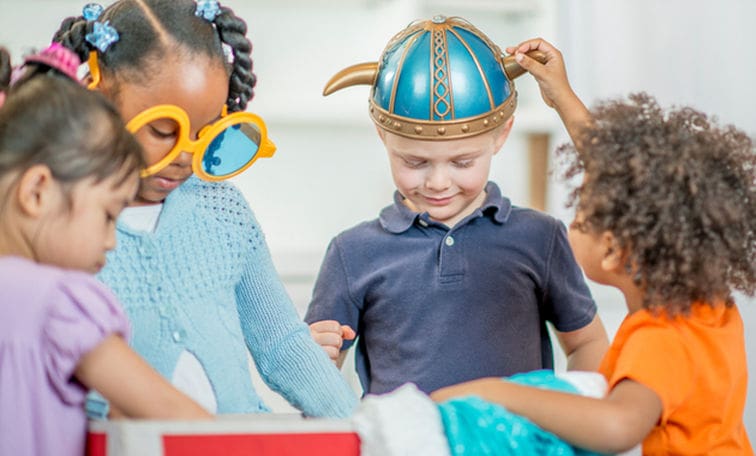
Imaginative play is a near-universal trait of childhood, and although it seems simple in its essence, young children build all kinds of important developmental skills from this very common activity. Below are some key points that demonstrate the importance of allowing your little one to engage in imaginative play.
Imaginative Play: Why is It Important?
* Imaginative play enhances your child’s creativity and inventiveness. When you see your toddler leaping around the house with a blanket on his back, you know that he is fully convinced that he’s a cape-clad superhero on a mission. Acting out various imaginative roles (e.g., a firefighter, a princess, a pirate, an animal, etc.), will essentially require your child to employ their creative thinking in order to “flesh out” the appropriate attributes and characteristics of those roles. This keeps your child in the habit of exercising their creative muscles.
* Imaginative play will improve your child’s cognitive and critical thinking skills. As your little one searches around the house for the perfect material to finish the construction of their “horse stable,” they’re using important problem-solving and critical thinking skills to help them accomplish the job. If your child is engaging in imaginative play with another toddler, they may have to put their heads together to divvy up roles or responsibilities for a particular scenario or game they’re playing. The skills your child learns and employs during these playtime sessions are a key part of their cognitive development, which will serve them well throughout their life.
* Imaginative play can boost your child’s language and communication skills as well. As your child engages in make-believe play with his/her toys or friends, you might be surprised at some of the sentences or phrases your little one can come up with! In fact, you will probably hear your child repeat some of the common expressions or words spoken around the house (which can sometimes come back to bite you). You might also hear your child pull off a perfect impression of mom, dad or even their favorite cartoon character. For the most part, imaginative play requires language and communication, and it will teach your child the power of using words and sentences to communicate thoughts and ideas.
* Imaginative play helps your child sharpen the all-important skill of self-regulation. As they interact in their imaginative environment, they will often play the narrator, director and/or actor, which will require them to self-correct, make key decisions and govern their actions in line with the scenarios they’re creating. Experimenting with different imaginary roles when playing with other kids can also teach your child important moral skills such as empathy and compassion, both of which call upon self-regulation in order to be expressed.
How to Encourage Your Child’s Imaginative Play
With the right tools, your child can turn any environment into a kid-approved wonderland. Here are some ideas for materials (i.e., “props”) to keep on hand in order to encourage your child’s imaginative play:
* Cardboard boxes of all sizes (a classic favorite)
* Various books, magazines, etc.
* Old items of clothing (e.g., shoes, hats, backpacks) that can be used for costumes
* Various plastic utensils, containers, dishes, etc.
* Dolls and stuffed animals of all kinds and sizes
* Old blankets, sheets or other pieces of fabric
* Cardboard tubes from paper towels, wrapping paper, etc.
* Writing materials (e.g., paper, washable markers, pencils, notepads, etc.)
* Pipe cleaners (i.e., fuzzy wires)
* Cotton balls, aluminum foil, and other materials that can assume all kinds of “identities”
To keep yourself from going insane, be sure to keep these various materials in some type of box in a designated corner of the house. Now turn your toddler loose and enjoy the show!

